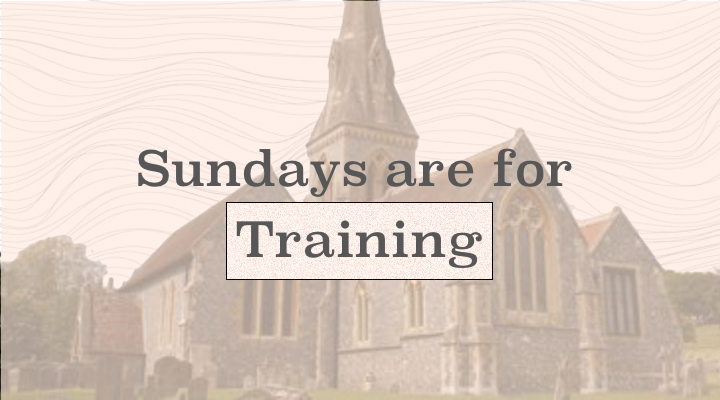I graduated from High School and Bible College with adequate grades. I tried, but I didn’t exactly over-exert myself, to be honest. “Coasting” was probably the right word for it. I learned enough and enjoyed the classes I enjoyed and got through the classes I needed to get through.
Regrets
Not a day goes by that I don’t wish I had tried harder, particularly in Bible School. Like, really tried, with maximum effort and focus. I wasn’t looking ahead. Because ministry seemed so far off and kind of vague, I wasn’t 100% all-in. I learned so much, but clearly not enough. It was a blessed time of simply studying the Word of God, writing theological papers, and reading theological books.
Now, in the heat of battle, in the thick of the jungle, in the craziness of life and ministry, I’m noticing some gaps in my biblical studies, even my Christian life as a whole. I often think to myself, “If only I had just listened better in the quiet of Bible College, these deficiencies I face today wouldn’t be so glaring.”
As wonderful as theological training is though, God’s primary means of growing his people into capable servants is through the local church.
We’ll always have gaps in our understanding or blind spots in our walks with the Lord, but they won’t always be as drastic as they are now. I’m comforted by that truth. Who I am now isn’t who I will always be because of the sanctifying work of the Holy Spirit through the Body of Christ, a process God puts every believer through.
As Charles Spurgeon explains in his sermon, The Best Donation¹:
Nothing in the world is dearer to God’s heart than his church; therefore, being his, let us also belong to it, that by our prayers, our gifts, and our labours, we may support and strengthen it. If those who are Christ’s refrained, even for a generation, from numbering themselves with his people, there would be no visible church, no ordinances maintained, and, I fear, very little preaching of the gospel
Ephesians 4:11-16
And he gave the apostles, the prophets, the evangelists, the shepherds and teachers, to equip the saints for the work of ministry, for building up the body of Christ, until we all attain to the unity of the faith and of the knowledge of the Son of God, to mature manhood, to the measure of the stature of the fullness of Christ, so that we may no longer be children, tossed to and fro by the waves and carried about by every wind of doctrine, by human cunning, by craftiness in deceitful schemes. Rather, speaking the truth in love, we are to grow up in every way into him who is the head, into Christ, from whom the whole body, joined and held together by every joint with which it is equipped, when each part is working properly, makes the body grow so that it builds itself up in love.
We coast through school, our jobs, or other areas in our lives, but we best not coast through God’s training program: Sunday Mornings.
The text above is an indictment of 90% of Evangelical churches today who are committed to entertaining their people, rather than training them. Every church building, with its interior decorating, communicates something about the gathering’s overall purpose.
Back in the old days, the Gothic cathedral, with its incredibly tall ceilings, was designed to cause its people to consider God’s greatness and majesty — this was intended to lead the church to right living under the Lordship of their Maker.
Now, for mainstream Evangelicals, the church has been turned into a club. The sanctuary is a theater, the pulpit looks more like a stage, its people: an audience. Fog machines, bright lights, coffee shops — these often obscure the real purpose of Sunday morning gatherings: training for Gospel ministry.
The purpose of the gifted believers, the ones who are mentioned in verses 7–11, isn’t to leave us with warm feelings or viral moments. Evangelists, shepherds, and teachers give members of the church family the tools they need for ministry, which includes doctrinal stability.
This leads to mutual edification, building up, growth, and sanctification. We all attain to the unity of the faith and the knowledge of the Son of God together. Maturity and manhood, the fullness of Christ, growing into the head —these primarily take place in a church context when we meet together on the Lord’s Day.
Multifaceted Grace
Sundays mornings are critical to your Christian growth and the growth of others. I would even go so far as to say that you can’t die to sin and live to God without it. The most remarkable, mysterious aspect of our Sunday Morning Training is that God has modified your training for your specific circumstances and your maximum good, for His glory.
In other words, your training looks nothing like mine, and your life experiences (ordained by a perfect and wise God) are completely different than my own. Therefore, God is revealing Christ and His all-sufficient power in marvelous ways that you can actually tell me about. When I find myself unbalanced or having tunnel-vision in the Christian life (perhaps I am undervaluing God’s holiness or overlooking a besetting sin) another brother or sister often helps me to see it.
This is why Peter calls God’s grace “multifaceted” (1 Pet. 4:10). It is various, like when I hold a prism up to the light. The light is the same, but the prism changes its colors, depending on where the light shines through it.
You and I have had to abide in Christ in many different contexts and for many reasons, but the Christ who has delivered us from our flesh remains the same. It’s absolutely invigorating to hear those I pastor encourage others in the congregation who are struggling, using the truth they’re learning in our corporate worship time.
Training Day
I may not have put maximum effort into school, but there are things I work really hard at. I like to run, and when the marathon season is coming, I train hard. I love to read theology and I work really hard alongside my wife to train my children in the faith. I play basketball with my youth group Wednesday nights, awkwardly sweating through every article of clothing.
We’re all dedicated to greatness in at least one area of our lives, so we better not coast through our Sunday mornings. Let’s commit to greatness in this area, because Christ demands it of us. She is to be treasured because the Lord gave His life for her (Eph. 5:35), and this is where we prepare for whatever ministry we may encounter in the week to follow.
It’s within the Sunday gathering that our priorities are reoriented, out doctrine is sharpened, our sin is revealed, and our love for one another increases.
Consider Pastor John Macarthur’s list² of all the “one another’s” we accomplish together in the church context every Sunday morning
- Love one another (Rom. 12:10; 13:8; 1 Thess. 3:12; 4:9; 2 Thess. 1:3; 1 Pet. 1:22; 4:8; 1 John 3:11, 23; 4:7, 11–12; 2 John 5).
- Live in harmony with one another (Rom. 12:16; 15:5; cf. Gal. 5:26; 1 Thess. 5:13).
- Welcome one another (Rom. 15:7; cf. Rom. 16:16).
- Admonish one another (Rom. 15:14; Col. 3:16).
- Care for one another (1 Cor. 12:25).
- Serve one another (Gal. 5:13; 1 Pet. 4:10).
- Bear one another’s burdens (Gal. 6:2).
- Be patient with one another (Eph. 4:2; Col. 3:13).
- Be kind to one another (Eph. 4:32).
- Forgive one another (Eph. 4:32; Col. 3:13).
- Sing praises with one another (Eph. 5:19; Col. 3:16).
- Regard one another as more important than oneself (Phil. 2:3).
- Speak truth to one another (Col. 3:9).
- Encourage one another (1 Thess. 4:18; 5:11; Heb. 3:13; 10:25).
- Seek good for one another (1 Thess. 5:15).
- Stir up one another to love and good deeds (Heb. 10:24; cf. 1 Tim. 6:17–18).
- Confess your sins to one another (James 5:16).
- Pray for one another (James 5:16).
- Be hospitable to one another (1 Pet. 4:9).
- Be humble toward one another (1 Pet. 5:5).
Sundays teach us to care for those we wouldn’t normally spend time with, and give to causes that have eternal ramifications.
They give us the privilege of observing the lives of brothers and sisters, many who are farther along in life and have seen Christ do marvelous things.
Sundays are beautiful, and they’re for training.
- Spurgeon, Charles. Sermon 2234, Metropolitan Tabernacle Pulpit Volume 37.
- MacArthur, John. Biblical Doctrine, page 753.






Robert, thank you very much for the kind words, brother. That sincerely means a lot to me that your spirit…